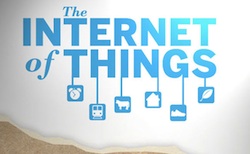IoT Caveats for Chip Makers

If nothing else, the Internet of Things certainly does generate a lot of research reports.
The latest comes from the respected management consulting firm McKinsey & Co. that zeroes in on the semiconductor industry's substantial stakes in the success of the IoT. McKinsey and the Global Semiconductor Alliance (GSA), whose members include key chip makers like ARM Ltd., Broadcom, GlobalFoundries and Micron Technologies, collaborated on the survey and report released earlier this month.
The partners took another whack at defining the IoT, settling on this: "A network containing all 'smart' devices with some sort of sensing mechanism that can communicate via the Internet with other smart devices or the cloud, without human interaction."
The chip industry, of course, has a huge stake in making this work by adding intelligence to sensors and other connected devices. Then there is all that unstructured sensor data to be processed and organized to gain business insights.
Surprisingly, GSA members expressed some skepticism about the IoT's potential to drive future chip development and sales. Among the unresolved issues cited by chipmakers is network security. Most believe chip security is adequate, but some worry about the security and data privacy vulnerabilities in the cloud.
According to the McKinsey survey, only 48 percent said the IoT would be among the "top three growth drivers" for the semiconductor industry. A mere 17 percent ranked it as the top chip technology driver.
As other IoT surveys have found, industrial automation looks to be an early candidate to leverage IoT chip and networking technologies. The McKinsey report bears this out, noting that automation technology is "widely available as is the IT and network infrastructure." The only caveat for the industrial IoT, the survey notes, is "system security needed for safe connection of manufacturing controls to the Internet."

Attention cloud service providers: The report further notes that private clouds currently lack the functionality needed to handle large industrial automation applications.
Then there is cloud security and data privacy. The McKinsey report concludes, "The real challenge lies in using available technology to implement end-to-end security solutions for the entire IoT stack—cloud, servers, and devices." It quoted one chip executive as warning, "Overall security is only as good as its weakest point."
Many chipmakers said a narrow focus on silicon would not justify the significant investment needed to become a player in the emerging IoT market. Hence, semiconductor manufactures are beginning to target multiple layers of the technology stack, McKinsey found, including software, security and systems integration.
If that scenario pans out, the likelihood of more tech industry consolidation grows. (The report did not address that issue.)
Seeking value beyond silicon and software likely translates into a greater focus on IT infrastructure such as servers, virtualization and delivering cloud services, the report concludes. These expanded services would run on top of traditional chip technologies like processors, networking chips and embedded sensors.
The report advises chipmakers to look before they leap into IoT markets. For example, it stressed that "expanding beyond silicon may necessitate a completely new business model, such as one that focuses on usage-based pricing."
Related
George Leopold has written about science and technology for more than 30 years, focusing on electronics and aerospace technology. He previously served as executive editor of Electronic Engineering Times. Leopold is the author of "Calculated Risk: The Supersonic Life and Times of Gus Grissom" (Purdue University Press, 2016).










